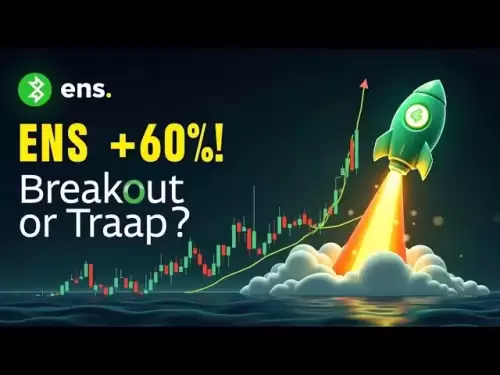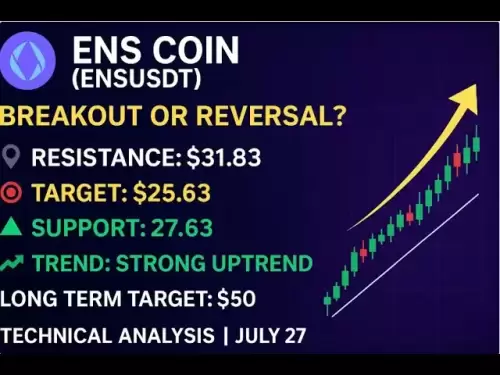-
 Bitcoin
Bitcoin $119800
1.38% -
 Ethereum
Ethereum $3873
3.25% -
 XRP
XRP $3.247
1.85% -
 Tether USDt
Tether USDt $1.001
0.02% -
 BNB
BNB $840.4
5.94% -
 Solana
Solana $190.0
2.55% -
 USDC
USDC $1.000
0.03% -
 Dogecoin
Dogecoin $0.2433
2.69% -
 TRON
TRON $0.3197
-0.05% -
 Cardano
Cardano $0.8367
1.39% -
 Sui
Sui $4.327
3.11% -
 Hyperliquid
Hyperliquid $44.00
0.31% -
 Stellar
Stellar $0.4461
1.76% -
 Chainlink
Chainlink $19.25
4.61% -
 Hedera
Hedera $0.2941
3.90% -
 Bitcoin Cash
Bitcoin Cash $598.4
6.89% -
 Avalanche
Avalanche $26.19
4.67% -
 Litecoin
Litecoin $115.1
0.50% -
 Shiba Inu
Shiba Inu $0.00001427
1.55% -
 Toncoin
Toncoin $3.379
2.01% -
 UNUS SED LEO
UNUS SED LEO $8.966
-0.16% -
 Ethena USDe
Ethena USDe $1.001
0.02% -
 Uniswap
Uniswap $11.04
4.16% -
 Polkadot
Polkadot $4.239
2.00% -
 Monero
Monero $324.6
0.36% -
 Bitget Token
Bitget Token $4.672
2.46% -
 Pepe
Pepe $0.00001294
2.69% -
 Dai
Dai $0.0000
0.01% -
 Cronos
Cronos $0.1443
2.71% -
 Aave
Aave $302.9
1.98%
Are the market hours for Bitcoin ETFs 24/7?
Bitcoin ETFs don't trade 24/7 like Bitcoin; they follow the specific hours of the exchange they're listed on, typically 9:30 AM to 4:00 PM ET on weekdays.
Mar 28, 2025 at 06:50 pm
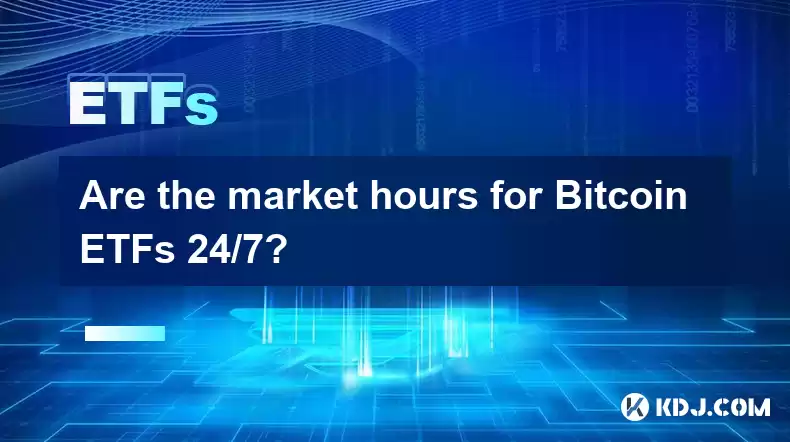
Understanding Bitcoin ETF Trading Hours
The question of whether Bitcoin ETFs trade 24/7 is complex and depends on several factors. Unlike Bitcoin itself, which trades globally around the clock, Bitcoin ETFs are subject to the trading hours of the exchange on which they are listed. This means that their market hours are not 24/7, but rather dictated by the specific exchange's operating schedule.
This is a crucial distinction. While you can buy and sell Bitcoin at any time of day or night on decentralized exchanges, a Bitcoin ETF is a tradable security listed on a regulated exchange. Therefore, its trading hours are constrained by the exchange's opening and closing times.
Exchange-Specific Trading Hours
The trading hours for a Bitcoin ETF will vary depending on the exchange where it is listed. For example, if a Bitcoin ETF is listed on the New York Stock Exchange (NYSE), its trading hours will generally follow the NYSE's schedule, typically 9:30 AM to 4:00 PM Eastern Time (ET), Monday to Friday. If listed on a different exchange, such as the Nasdaq, the hours will align with that exchange's schedule.
This means that outside of these specific hours, you cannot buy or sell shares of the ETF. While the underlying Bitcoin market may be active, the ETF itself will be closed for trading. This limitation is inherent to the nature of regulated securities markets. The price you see outside of trading hours will be the last traded price before the market closed.
After-Hours Trading and Pre-Market Trading
Some exchanges offer pre-market and after-hours trading sessions for certain securities. However, participation in these sessions is not guaranteed for all ETFs, including Bitcoin ETFs. Even if available, liquidity during these periods might be significantly lower than during regular trading hours. This means that your order might not be executed immediately, or you might experience a less favorable price.
Therefore, relying on after-hours or pre-market trading for Bitcoin ETFs can be risky, particularly for larger trades. The best practice remains to execute trades during the regular exchange trading hours to ensure better liquidity and price execution.
Impact of Global Bitcoin Market on ETF Pricing
It's important to remember that even though a Bitcoin ETF's trading hours are limited, the underlying Bitcoin market is global and operates 24/7. This means that the price of Bitcoin can fluctuate significantly even outside of the ETF's trading hours. When the ETF market reopens, the price will reflect the changes that occurred in the global Bitcoin market during the closed period.
This can lead to substantial price gaps between the closing price of the ETF and its opening price the next day. These gaps reflect the overnight movements in the Bitcoin market. Understanding this dynamic is crucial for investors who hold Bitcoin ETFs. Always monitor the global Bitcoin market for significant price movements, even when the ETF is not actively trading.
Factors Affecting Bitcoin ETF Trading Volume
The trading volume of a Bitcoin ETF is influenced by various factors, including the overall market sentiment towards Bitcoin, the ETF's expense ratio, its tracking performance compared to the underlying Bitcoin price, and general market conditions. The trading volume is naturally higher during the regular trading hours of the exchange.
Lower trading volume outside of regular trading hours can lead to wider bid-ask spreads, making it more expensive to buy or sell the ETF. It's crucial to be aware of this potential cost when considering trading outside of regular market hours.
How to Access Bitcoin ETF Information
Investors can find information about a specific Bitcoin ETF's trading hours and other important details on the exchange's website where the ETF is listed. The ETF's prospectus, typically available on the issuer's website, will also contain this information. Always refer to official sources for accurate and up-to-date information.
Financial news websites and brokerage platforms also often provide details about trading hours for various securities, including ETFs. However, always double-check this information with the official sources mentioned above. This ensures you are working with the most accurate and reliable data.
Frequently Asked Questions
Q: Can I trade Bitcoin ETFs on weekends?
A: No, Bitcoin ETFs, like other exchange-traded securities, generally do not trade on weekends. Their trading hours are limited to the regular business days of the exchange on which they are listed.
Q: What happens to the price of a Bitcoin ETF during non-trading hours?
A: The price displayed during non-trading hours is typically the last traded price before the market closed. However, the underlying Bitcoin price can fluctuate significantly during this time, leading to a price gap when the market reopens.
Q: Are there any risks associated with trading Bitcoin ETFs outside of regular market hours?
A: Yes, trading during pre-market or after-hours sessions, if available, typically involves lower liquidity and wider bid-ask spreads, potentially leading to unfavorable execution prices and higher transaction costs.
Q: How can I find the exact trading hours for a specific Bitcoin ETF?
A: Check the website of the exchange where the ETF is listed, or consult the ETF's prospectus for the most accurate and up-to-date information on trading hours.
Q: Does the 24/7 nature of the Bitcoin market affect the price of a Bitcoin ETF?
A: Absolutely. While the ETF itself doesn't trade 24/7, the underlying Bitcoin market does. Price movements in the Bitcoin market during non-trading hours will be reflected in the ETF's price when the market reopens. This can result in significant price gaps.
Q: Is it advisable to trade Bitcoin ETFs outside of regular market hours?
A: Generally, it's not advisable unless you are comfortable with the risks associated with lower liquidity, wider spreads, and potential for unfavorable price execution. Regular market hours usually offer better trading conditions.
Disclaimer:info@kdj.com
The information provided is not trading advice. kdj.com does not assume any responsibility for any investments made based on the information provided in this article. Cryptocurrencies are highly volatile and it is highly recommended that you invest with caution after thorough research!
If you believe that the content used on this website infringes your copyright, please contact us immediately (info@kdj.com) and we will delete it promptly.
- Bitcoin's Potential Final Rally: Decoding Historical Data and Future Projections
- 2025-07-28 06:30:11
- BlockDAG, XRP, and Utility-Driven Growth: A New Era for Crypto?
- 2025-07-28 06:30:11
- Litecoin's ADX Crossover: Rally Potential or False Dawn?
- 2025-07-28 06:50:11
- Arctic Pablo Coin: Meme Coin Mania and Presale Buzz in 2025
- 2025-07-28 06:50:11
- Arctic Pablo: Meme Coin Mania or ROI Rocket?
- 2025-07-28 06:55:11
- Worldcoin's Wild Ride: Uptrend Battles Resistance Amidst Regulatory Waves
- 2025-07-28 07:00:12
Related knowledge
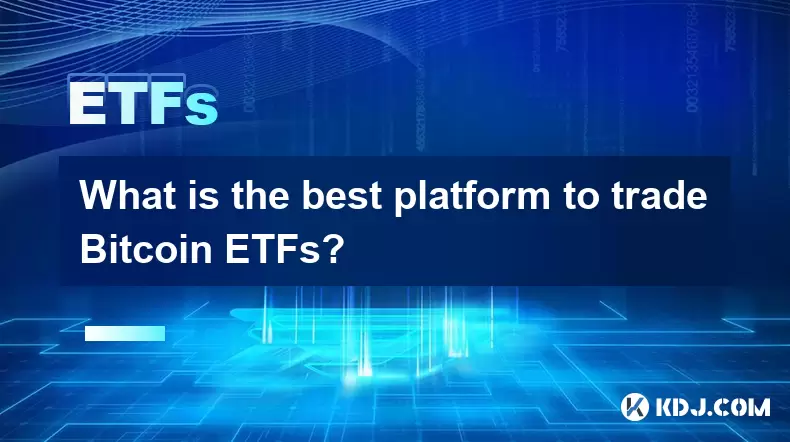
What is the best platform to trade Bitcoin ETFs?
Jul 23,2025 at 04:14am
Understanding Bitcoin ETFs and Their Role in TradingBitcoin Exchange-Traded Funds (ETFs) have gained significant traction among traditional and crypto...
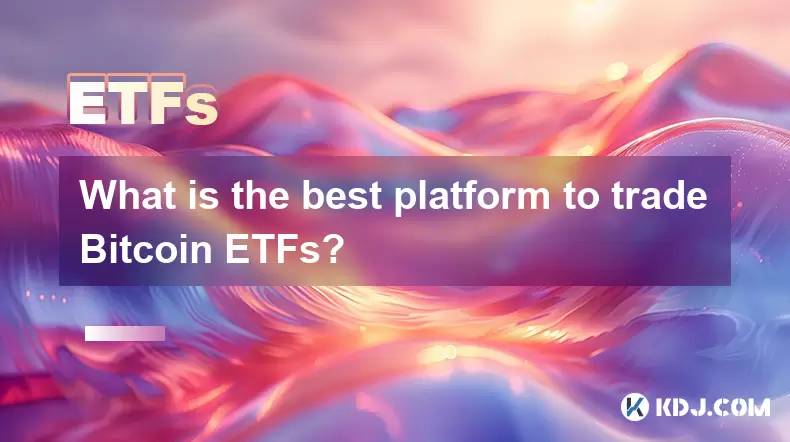
What is the best platform to trade Bitcoin ETFs?
Jul 17,2025 at 03:50pm
Understanding Bitcoin ETFs and Their Role in the MarketBitcoin Exchange-Traded Funds (ETFs) are investment vehicles that track the price of Bitcoin wi...
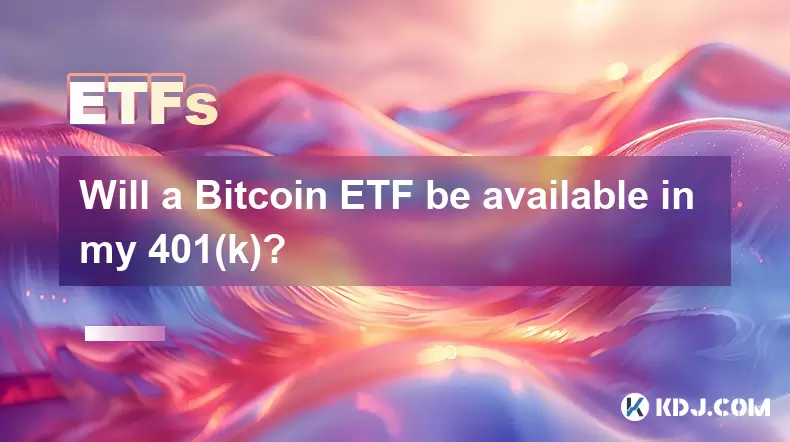
Will a Bitcoin ETF be available in my 401(k)?
Jul 17,2025 at 10:42pm
What is a Bitcoin ETF?A Bitcoin ETF (Exchange-Traded Fund) is an investment vehicle that tracks the price of Bitcoin without requiring investors to di...
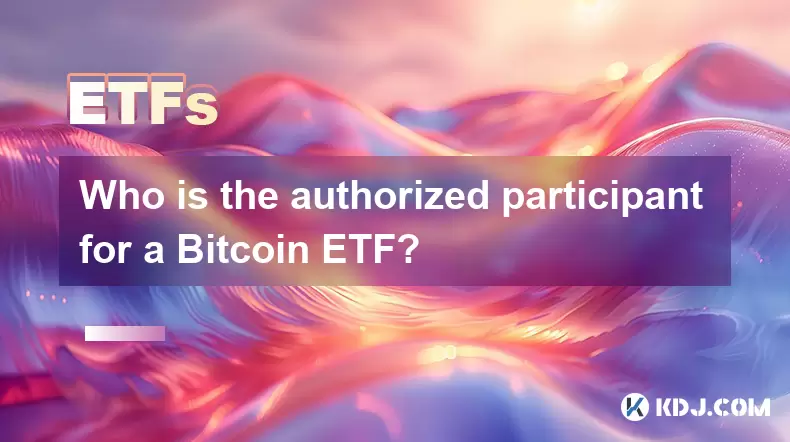
Who is the authorized participant for a Bitcoin ETF?
Jul 18,2025 at 12:42am
Understanding the Role of Authorized Participants in Bitcoin ETFsIn the context of Bitcoin Exchange-Traded Funds (ETFs), an authorized participant (AP...
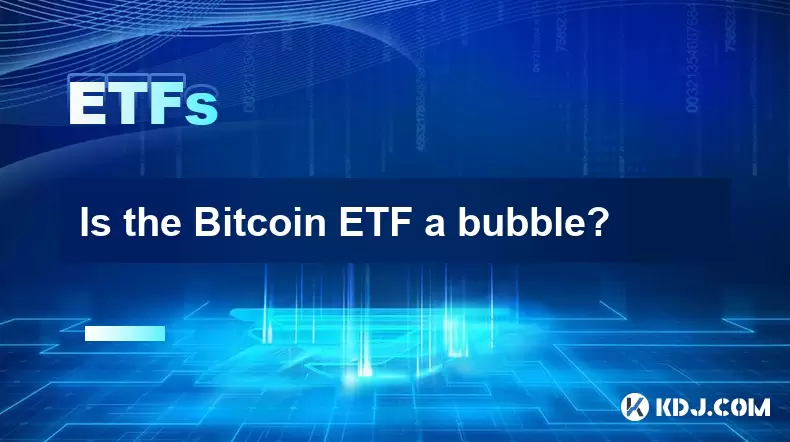
Is the Bitcoin ETF a bubble?
Jul 20,2025 at 06:57am
Understanding the Bitcoin ETF ConceptA Bitcoin Exchange-Traded Fund (ETF) is a financial product that aims to track the price of Bitcoin without requi...
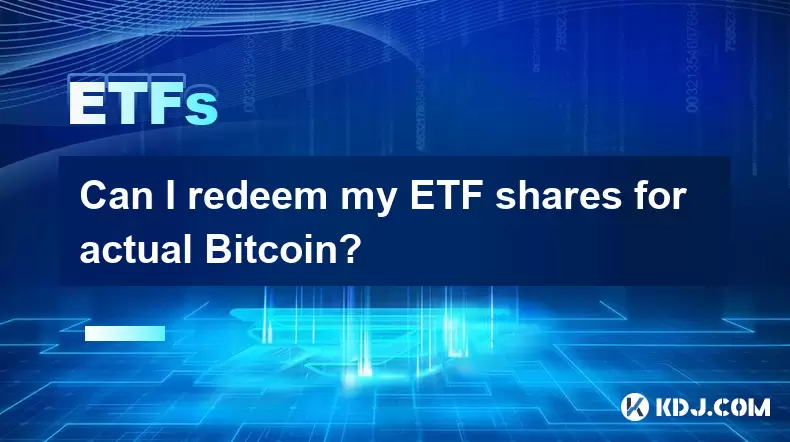
Can I redeem my ETF shares for actual Bitcoin?
Jul 17,2025 at 03:14pm
Understanding ETF Shares and Their Relation to BitcoinExchange-Traded Funds (ETFs) have become a popular investment vehicle for those looking to gain ...

What is the best platform to trade Bitcoin ETFs?
Jul 23,2025 at 04:14am
Understanding Bitcoin ETFs and Their Role in TradingBitcoin Exchange-Traded Funds (ETFs) have gained significant traction among traditional and crypto...

What is the best platform to trade Bitcoin ETFs?
Jul 17,2025 at 03:50pm
Understanding Bitcoin ETFs and Their Role in the MarketBitcoin Exchange-Traded Funds (ETFs) are investment vehicles that track the price of Bitcoin wi...

Will a Bitcoin ETF be available in my 401(k)?
Jul 17,2025 at 10:42pm
What is a Bitcoin ETF?A Bitcoin ETF (Exchange-Traded Fund) is an investment vehicle that tracks the price of Bitcoin without requiring investors to di...

Who is the authorized participant for a Bitcoin ETF?
Jul 18,2025 at 12:42am
Understanding the Role of Authorized Participants in Bitcoin ETFsIn the context of Bitcoin Exchange-Traded Funds (ETFs), an authorized participant (AP...

Is the Bitcoin ETF a bubble?
Jul 20,2025 at 06:57am
Understanding the Bitcoin ETF ConceptA Bitcoin Exchange-Traded Fund (ETF) is a financial product that aims to track the price of Bitcoin without requi...

Can I redeem my ETF shares for actual Bitcoin?
Jul 17,2025 at 03:14pm
Understanding ETF Shares and Their Relation to BitcoinExchange-Traded Funds (ETFs) have become a popular investment vehicle for those looking to gain ...
See all articles





















